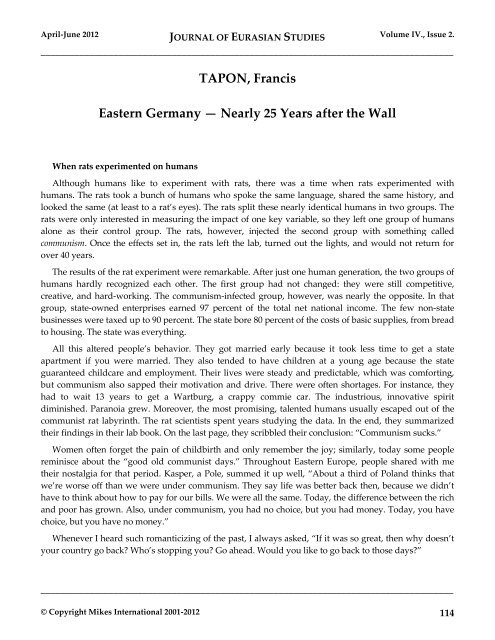You also want an ePaper? Increase the reach of your titles
YUMPU automatically turns print PDFs into web optimized ePapers that Google loves.
April-June 2012 JOURNAL OF EURASIAN STUDIES Volume IV., Issue 2.<br />
_____________________________________________________________________________________<br />
TAPON, Francis<br />
Eastern Germany — Nearly 25 Years after the Wall<br />
When rats experimented on humans<br />
Although humans like to experiment with rats, there was a time when rats experimented with<br />
humans. The rats took a bunch <strong>of</strong> humans who spoke the same language, shared the same history, and<br />
looked the same (at least to a rat’s eyes). The rats split these nearly identical humans in two groups. The<br />
rats were only interested in measuring the impact <strong>of</strong> one key variable, so they left one group <strong>of</strong> humans<br />
alone as their control group. The rats, however, injected the second group with something called<br />
communism. Once the effects set in, the rats left the lab, turned out the lights, and would not return for<br />
over 40 years.<br />
The results <strong>of</strong> the rat experiment were remarkable. After just one human generation, the two groups <strong>of</strong><br />
humans hardly recognized each other. The first group had not changed: they were still competitive,<br />
creative, and hard-working. The communism-infected group, however, was nearly the opposite. In that<br />
group, state-owned enterprises earned 97 percent <strong>of</strong> the total net national income. The few non-state<br />
businesses were taxed up to 90 percent. The state bore 80 percent <strong>of</strong> the costs <strong>of</strong> basic supplies, from bread<br />
to housing. The state was everything.<br />
All this altered people’s behavior. They got married early because it took less time to get a state<br />
apartment if you were married. They also tended to have children at a young age because the state<br />
guaranteed childcare and employment. Their lives were steady and predictable, which was comforting,<br />
but communism also sapped their motivation and drive. There were <strong>of</strong>ten shortages. For instance, they<br />
had to wait 13 years to get a Wartburg, a crappy commie car. The industrious, innovative spirit<br />
diminished. Paranoia grew. Moreover, the most promising, talented humans usually escaped out <strong>of</strong> the<br />
communist rat labyrinth. The rat scientists spent years studying the data. In the end, they summarized<br />
their findings in their lab book. On the last page, they scribbled their conclusion: “Communism sucks.”<br />
Women <strong>of</strong>ten forget the pain <strong>of</strong> childbirth and only remember the joy; similarly, today some people<br />
reminisce about the “good old communist days.” Throughout Eastern Europe, people shared with me<br />
their nostalgia for that period. Kasper, a Pole, summed it up well, “About a third <strong>of</strong> Poland thinks that<br />
we’re worse <strong>of</strong>f than we were under communism. They say life was better back then, because we didn’t<br />
have to think about how to pay for our bills. We were all the same. Today, the difference between the rich<br />
and poor has grown. Also, under communism, you had no choice, but you had money. Today, you have<br />
choice, but you have no money.”<br />
Whenever I heard such romanticizing <strong>of</strong> the past, I always asked, “If it was so great, then why doesn’t<br />
your country go back? Who’s stopping you? Go ahead. Would you like to go back to those days?”<br />
_____________________________________________________________________________________<br />
© Copyright Mikes International 2001-2012 114
















